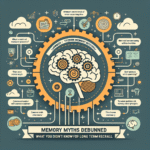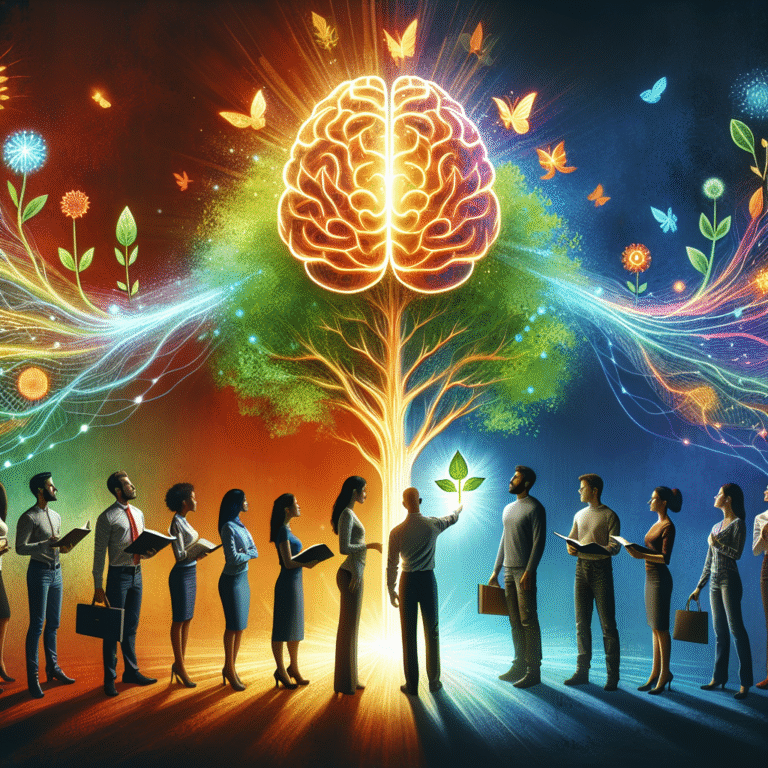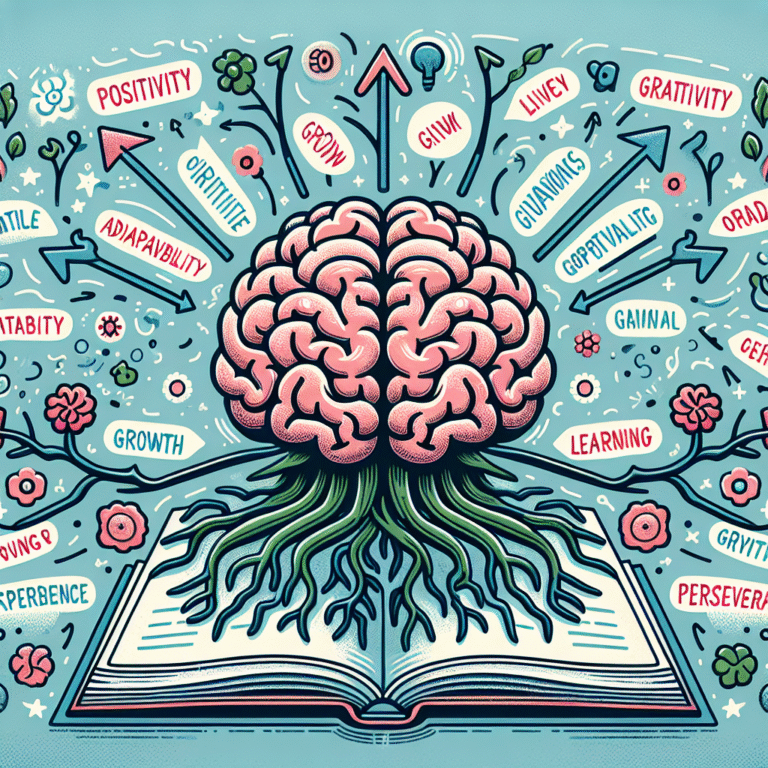
Introduction
Imagine waking up every morning filled with a profound sense of purpose, ready to conquer whatever challenges lie ahead. This isn’t just a daydream; it’s a reality shaped by one powerful concept: Transformative Self-Efficacy. How Believing in Yourself Can Change Your Life is not merely a catchy phrase; it’s a fundamental truth that can unlock your potential.
In a world filled with obstacles, doubt, and uncertainty, self-efficacy—the belief in your capabilities to achieve goals—becomes a critical factor for success and well-being. This notion transcends mere optimism. It’s about harnessing your internal power to influence outcomes in your life, whether personal or professional.
In this article, we will explore transformative self-efficacy, its significance, and how cultivating this belief can lead to measurable life changes. With actionable insights, captivating case studies, and an engaging tone, we set out on a journey to help you believe in yourself like never before.
What is Transformative Self-Efficacy?
Understanding the Concept
Transformative Self-Efficacy refers to the robust belief in one’s abilities to drive change and achieve specific outcomes. It is rooted in psychological theories, primarily the work of Albert Bandura, who posited that self-efficacy is a predictive factor of how people approach goals, tasks, and challenges.
| Key Components of Transformative Self-Efficacy |
|---|
| Goal Setting: Defining clear, achievable objectives. |
| Persistence: Staying committed despite setbacks. |
| Resilience: Recovering quickly from difficulties. |
| Self-Regulation: Managing emotions and behaviors. |
The Power of Belief
Believing in yourself doesn’t mean ignoring your limitations; it means understanding and working within them. This belief system can lead to transformative changes in how you perceive obstacles, making you more likely to tackle challenges head-on.
The Psychology Behind Self-Efficacy
The Role of Mindset
Mindset plays a crucial role in shaping your belief in yourself. Psychologist Carol Dweck’s research on fixed vs. growth mindsets indicates that those with a growth mindset—who believe their abilities can be developed—are more likely to achieve their goals.
| Fixed Mindset vs. Growth Mindset |
|---|
| Fixed Mindset: Intelligence is static. Challenges are avoided. |
| Growth Mindset: Intelligence can be developed. Challenges are embraced. |
Real-World Impact: Case Study of J.K. Rowling
Consider the journey of J.K. Rowling, author of the beloved "Harry Potter" series. Initially, she faced numerous rejections from publishers and battled personal hardships. Yet, her belief in her storytelling abilities fueled her persistence. This transformative self-efficacy led her to become one of the bestselling authors in history, illustrating how believing in yourself can redefine your life’s trajectory.
Analysis: Rowling’s story underscores the importance of resilience and self-belief in overcoming external challenges.
How to Cultivate Transformative Self-Efficacy
Strategies for Building Self-Efficacy
Set Specific Goals: Define what you wish to achieve. Specificity provides clarity and direction.
Celebrate Small Wins: Acknowledge progress, no matter how small. Each victory reinforces your belief in your capabilities.
Seek Out Role Models: Learn from those who have achieved similar goals. Their journeys can serve as a blueprint for your own success.
Practice Positive Affirmations: Use daily affirmations to build a mindset of confidence. Repeating phrases such as “I am capable” can rewire your beliefs.
- Engage in Reflective Practices: Journaling about your experiences can help clarify your thoughts and enable you to recognize your growth over time.
Transformative Self-Efficacy in Action: Case Study of Oprah Winfrey
Oprah Winfrey, a media mogul and philanthropist, faced tremendous challenges in her early life, including poverty and trauma. Nevertheless, her transformative self-efficacy guided her to overcome these obstacles. Winfrey’s belief in her ability to connect with people and share their stories created one of the most successful talk shows in history.
Analysis: Winfrey’s transformation exemplifies how self-efficacy allows individuals to transcend their circumstances and achieve greatness.
The Connection Between Self-Efficacy and Well-Being
Psychological Benefits
Transformative self-efficacy extends beyond accomplishments; it significantly impacts mental health. Individuals with high self-efficacy tend to experience:
- Lower levels of stress and anxiety.
- Increased motivation.
- Greater resilience in adversity.
Physical Health Benefits
Believing in yourself can also improve physical well-being. Research indicates that those with high self-efficacy are more likely to engage in health-promoting behaviors, such as exercising regularly, eating healthily, and following medical advice.
The Role of Environment and Support Systems
Building a Supportive Network
Surrounding yourself with positive influences significantly boosts self-efficacy. A supportive network encourages personal growth and reinforces belief systems.
| Support Systems |
|---|
| Family: Offers emotional backing. |
| Friends: Provide motivation and encouragement. |
| Mentors: Share wisdom and guidance. |
The Impact of Negative Influences
Conversely, negative environments can undermine your belief in yourself. Toxic relationships or unsupportive atmospheres can diminish your self-efficacy and stifle growth.
Real-Life Applications of Transformative Self-Efficacy
In Career Development
In professional settings, individuals with high self-efficacy are more likely to pursue promotions, seek new opportunities, and take on leadership roles. They are often seenas more resilient and adaptable, making them valuable assets in any organization.
In Education
In the realm of education, students with strong self-efficacy demonstrate higher academic performance, greater persistence in the face of challenges, and increased engagement in their studies. They are more likely to set ambitious goals and strive to achieve them.
In Personal Relationships
Transformative self-efficacy can also enhance personal relationships. Believing in your ability to communicate effectively and resolve conflicts instills confidence, enabling healthier interactions and deeper connections with others.
Conclusion
Transformative Self-Efficacy: How Believing in Yourself Can Change Your Life is not just a motivational phrase; it is a guiding principle backed by scientific research and real-world examples. By fostering a belief in your abilities, setting clear goals, and cultivating supportive environments, you position yourself for transformative experiences in every aspect of your life.
As you embark on this journey, remember that self-efficacy is a skill that can be developed. Embrace challenges, celebrate your progress, and never underestimate the power of belief. Your life can change spectacularly when you believe in yourself.
FAQs
1. What is self-efficacy, and how is it different from self-esteem?
Self-efficacy is the belief in your ability to achieve specific goals, while self-esteem refers to your overall sense of self-worth. Self-efficacy is more task-specific, affecting how you approach challenges and goals.
2. How can I improve my self-efficacy?
You can improve self-efficacy by setting achievable goals, celebrating small successes, seeking positive role models, practicing self-reflection, and using positive affirmations.
3. Can self-efficacy be developed at any age?
Yes, self-efficacy can be developed at any age. Engaging in new experiences, setting goals, and reflecting on successes are effective strategies for individuals of all ages.
4. What role do mentors play in enhancing self-efficacy?
Mentors can provide guidance, share valuable experiences, and offer encouragement, all of which contribute to building your belief in your capabilities.
5. Are there any risks to having too much self-efficacy?
While self-efficacy is beneficial, overconfidence can lead to unrealistic goal-setting or underestimating challenges. It’s crucial to balance self-efficacy with self-awareness and a realistic perspective on challenges.
Cultivating Transformative Self-Efficacy: How Believing in Yourself Can Change Your Life opens doors to unlimited possibilities. The journey begins with you; take that first step towards believing in your transformative potential!

















